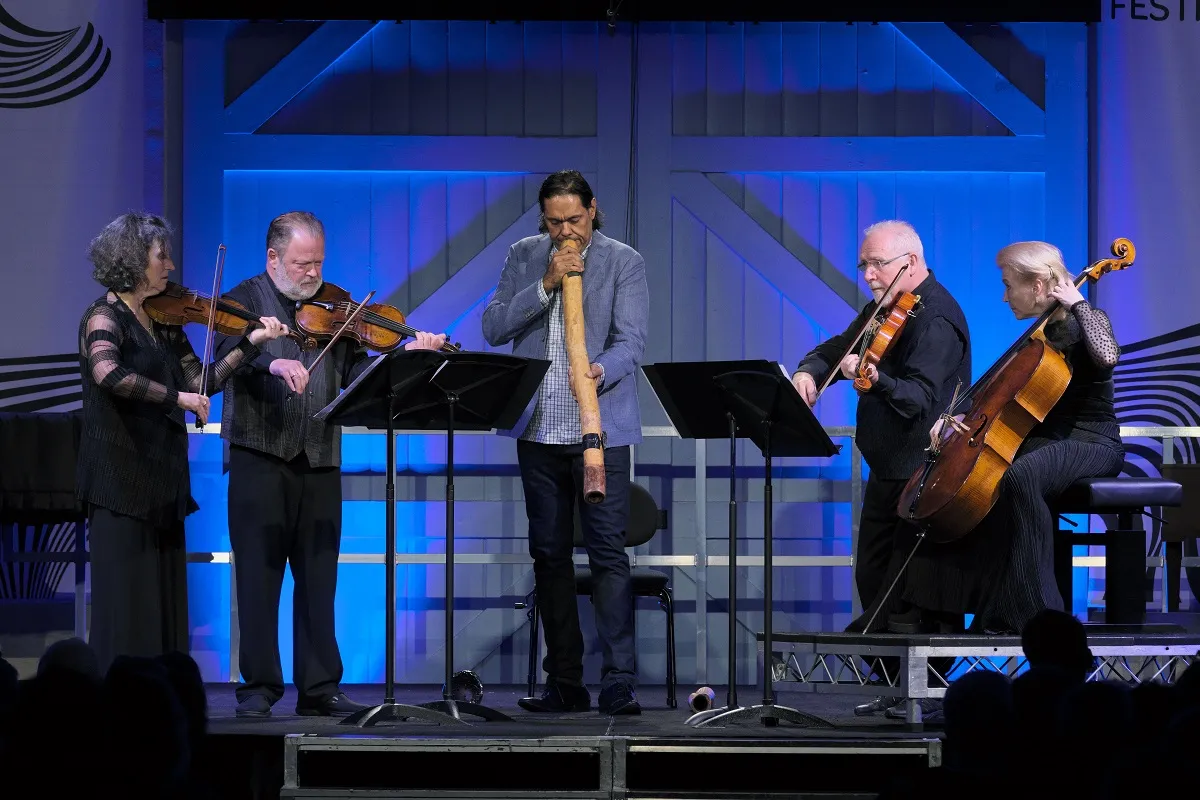CIMF Concert 6: “Bach Barton Brodsky”. At Fitters’ Workshop, April 30. Reviewed by HELEN MUSA.
IT must have been annoying for Roland Peelman and his copywriters that neither Andrew Ford nor Franz Schubert had a surname beginning with “B”, for the memorable concert last night, cleverly titled “Bach Barton Brodsky”, had far more in it than the Three Bs.
This concert satisfied on all levels and must have given great satisfaction to its sponsors, Brian and Dianne Anderson.
It began with JS Bach’s Violin Sonata, re-imagined by the Brodsky Quartet, now at the very height of their powers.
Bookended by a powerful adagio and an exciting concluding presto, the quartet showed us in-between, the full range of this musical form, performing the Fuga (Allegro) with most satisfying mathematical precision, followed with the Siciliana, in which each instrument spoke eloquently to each other.
Next up was William Barton’s composition, “Square Circles Beneath The Red Desert Sand,” where initially the Brodskys provided a gentle drone as Barton made his way slowly into the auditorium, vocalising calls set to a haunting melody. As the work for the strings became more intricate, Barton created percussive effects and deeply resonant melodies on the didgeridoo, even deeper than Jacqueline Thomas’s potent cello.
Close to the heart of many Canberrans is the subject of Andrew Ford’s “Eden Ablaze”, his seventh String Quartet, written when the bushfires were knocking at our doors — he lives in Robertson, NSW.
Ford was on hand to give Barton a moment to catch his breath and told us how “Eden Ablaze” had resulted from email correspondence with the Brodskys during the time of the 2019 fires. When they told him that Barton would soon be performing with them in England, he had decided to include a part for didgeridoo.
He signed off on his composition in March 2020, then covid struck meaning that last night’s Canberra performance was the first time the Brodskys had performed with Barton and thus a belated world premiere.
This was a painterly piece of music that evoked the aftermath of the bushfires more than their raging actuality, with both the trembling strings and the didgeridoo suggesting ash falling to the ground.
“We found a place that was a really still in shrouded in smoke. About the only movement was specks gently falling from the sky,” Ford said.
An unusual aspect of this work is that to open, Ford appropriates Xerxes’ aria “Ombr mai fu” from Handel’s opera of the same name, sung in praise of the beautiful plane tree, which shades the king, a match for his underlying metaphor of the Gondwana forests of Australia which burned in 2019 for the first time.
The second half of the program saw the performance of Franz Schubert’s Quartet in G Major D 887, the composer’s fiendishly ambitious work usually believed to be his string quartet version of “a grand symphony”.
An audience remember sitting near me said she was daunted by the likelihood that this would run for 40 minutes, but she need not have worried – it felt like just five minutes, as the Brodsky Quartet plunged themselves into this intensely dramatic work, in which Schubert first plays with our musical sensibilities by changing between major and minor keys.
On a personal note, I must admit to having had a near out-of-body vision for a second or two during the beautiful cello part of the second movement, andante un poco moto, but I was fully compos mentis for the concluding allegro assai.
Another roof-raising performance by the Brodsky Quartet at this music festival.
Feature image: William Barton performs his own composition, “Square Circles Beneath The Red Desert Sand”, with the Brodsky Quartet. Photo: Peter Hislop
This review was originally written and published by HELEN MUSA from CityNews on 28 April 2023.
